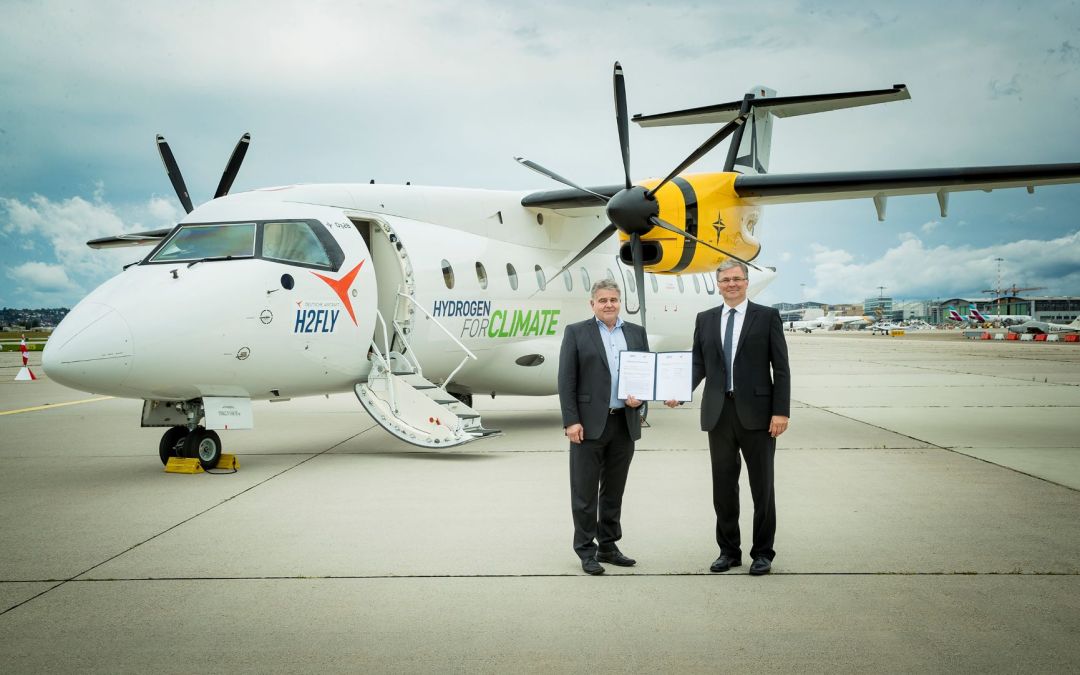Deutsche Aircraft builds a hydrogen-electric test bed

Two German start-up companies have joined forces in developing a zero-emission regional aircraft. Deutsche Aircraft, the initiative behind the Dornier D328eco, and fuel cell specialist H2FLY plan to flight test a hydrogen fuel cell demonstrator in 2025, the two announced on July 6. Deutsche Aircraft builds a hydrogen-electric test bed.
Deutsche Aircraft was launched in 2020 as an initiative to develop an efficient and eco-friendly aircraft based on the Dornier Do-328. The high-wing turboprop was produced between 1991 and 2000 by Dornier before the German OEM was bought by Fairchild and the 328 became known as the Fairchild-Dornier. There was also a version with turbofan engines, the 328JET. In total 217 aircraft have been produced.
Deutsche Aircraft will produce the D328eco at a new Final Assembly Line at Leipzig-Halle Airport. At 23.31 meters, the eco-version is slightly longer than the original 328 at 21.23 meters. Thanks to the extension, the cabin can accommodate 40-50 seats compared to 30-33 in the original version. The average layout will be for 43 seats. The wingspan is unchanged at 20.98 meters. The empennage will be produced by GKN Aerospace.
What makes the D328eco eco-friendly is the improved engines. The Pratt & Whitney PW119B turboprops are replaced by the newer PW127S that are more powerful to handle the higher Maximum Take-Off Weight. They have been modified to run on sustainable aviation fuels (SAFs), which is the key differentiator and should give the D328eco an edge over its rivals when it should enter service in 2025, a year later now than announced in early 2020.
Two 1.5 MW electric engines
That same year, Deutsche Aircraft builds a hydrogen test-bed. The demonstrator will get hydrogen fuel cells to drive two 1.5 MW electric engines. Deutsche Aircraft and H2FLY signed a Memorandum of Understanding on July 6 on the research and development of the aircraft and validate the potential of hydrogen. This includes technical and certification specifications for fuel cells in large aircraft, covered by EASA’s CS25 guidelines. Also involved in the project is Stuttgart Airport to assist with setting up the hydrogen infrastructure.
Both companies have full support from the German government. It has been a participator of Deutsche Aircraft since the start and continues to support the OEM through research and development funding. Sierra Nevada Corporation (SNC) is the major shareholder of Deutsche Aircraft. The Sparks (Nevada)-based company is a Tier 1 superior supplier to the US Air Force and has a 55-year history of offering technical solutions to the civil, military, and space industry, including major structural modifications. A subsidiary of SNC is 328 Support Services GmbH, which offers technical support to 328 operators from the original Dornier site at Oberpfaffenhoven near Munich. Deutsche Aircraft is the holder of the 328 type certificate.
H2FLY has its roots in a partnership between the largely government-funded German Aerospace Center (DLR) and the University of Ulm. Its purpose is to develop a hydrogen-based powertrain for use on general aviation and regional aircraft, as well as air taxis. The regional aircraft which is planned for 2030 would have a peak power of 3 MW. Based on the electric Pipistrel G4, H2FLY flew its HY4 in 2016 and became the first hydrogen-electric aircraft to do so.
Deutsche Aircraft builds a hydrogen-electric test bed | AirInsight
'Fuel Cell' 카테고리의 다른 글
| 使えばデジタル通貨がもらえる? 韓国の大学教授がデザインしたサステナブルなトイレ (0) | 2021.07.15 |
|---|---|
| Ballard Receives Initial Order for Fuel Cell Modules to Power 15 Tata Motors Buses in India (0) | 2021.07.09 |
| 에이치앤파워, 가온셀과 수소지게차 충전소 실증 MOU (0) | 2021.07.07 |
| ルノー、燃料電池車の合弁に関して発表 7月6日 (0) | 2021.07.06 |
| 케이세라셀, 고온 수전해 국산화기술 개발 추진 (0) | 2021.07.06 |


